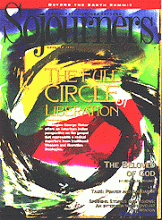Kairos is a Greek word that means decisive time. It is a ripe time, filled with danger and opportunity, a time that requires both discernment and bold action. The good news of Jesus Christ is inevitably linked to kairos as a time of conflict, danger, opportunity, and discipleship.
By way of example, the word "kairos" is first used in Mark's gospel immediately after the arrest of John the Baptist and immediately before Jesus calls the disciples to follow: "The kairos is fulfilled, and the kingdom of God is at hand; repent, and believe in the gospel" (Mark 1:15).
1992, the 500th anniversary of Columbus' arrival in the Americas, adds urgency to the need for discernment and creative action (see "1992: Rediscovering America," October 1991). Celebrating Columbus Day, as George Tinker reminds us, is part of America's "foundational mythology," a delusion that isn't healthy for white America, indigenous peoples, or other communities of color. 1992, therefore, is part of the context in which we discern the kairos, a time ripe for relearning, repentance, and new vision.
Kairos entered my vocabulary because of the faithful witness of Christians in South Africa, who issued their own kairos document in 1985. The South African document named the crisis and opportunity of faith in the context of church practices and theologies that either embraced or subverted apartheid. The essence of kairos was not apartheid itself or the depth of injustice; it was the degree to which people of faith, churches, and "Christian" theologies encouraged, participated in, or remained silent in the face of massive injustice. The South African Kairos Document called people of faith to repentance and bold action to dismantle apartheid.
Read the Full Article

